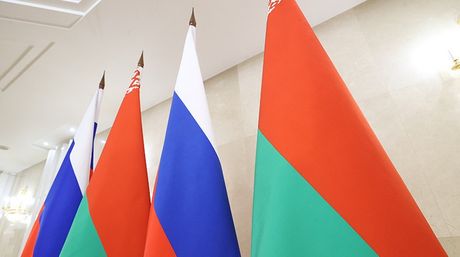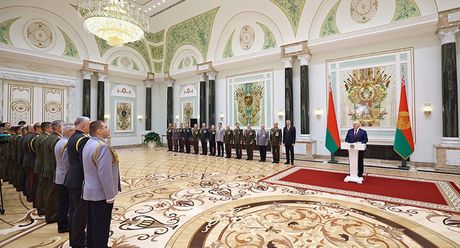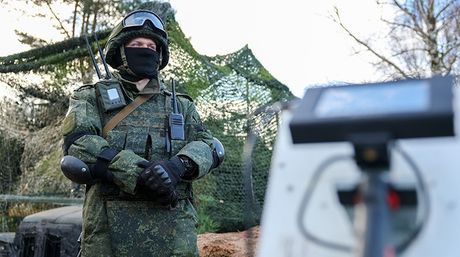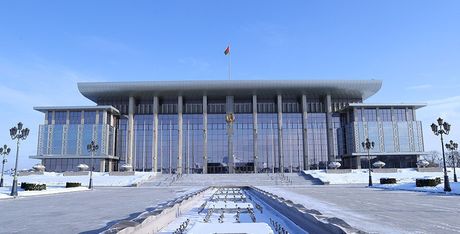Putin met of the Supreme Eurasian Economic Council
13:42, 14 April
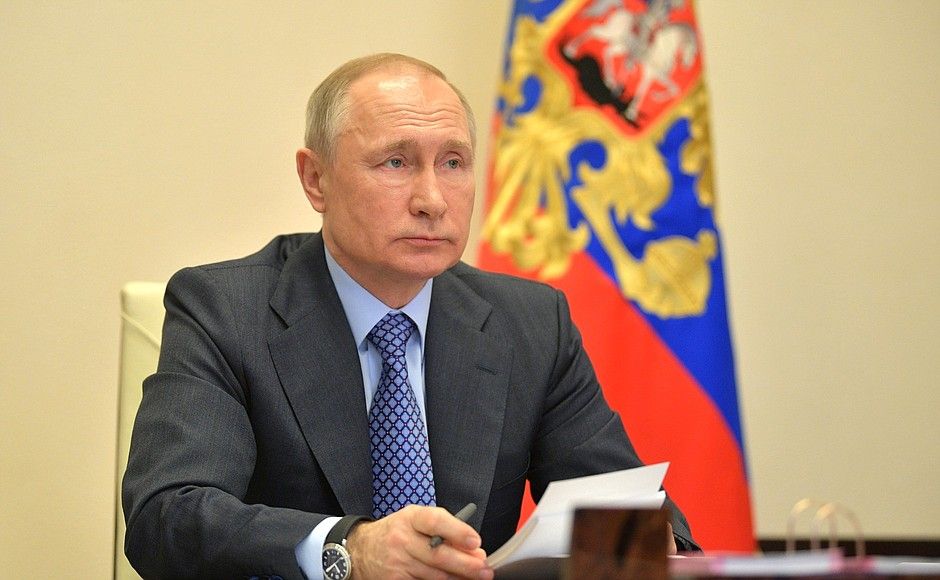
Vladimir Putin took part, via videoconference, in a meeting of the Supreme Eurasian Economic Council on measures to combat the coronavirus and support economic stability in the Eurasian Economic Union member states.
- Share on Facebook
- Share on VK
- Share on Twitter
In the meeting also took part President of the Republic of Belarus Alexander Lukashenko, President of Kazakhstan Kassym-Jomart Tokayev, President of Kyrgyzstan Sooronbay Jeenbekov and Prime Minister of Armenia Nikol Pashinyan.
The Supreme Eurasian Economic Council adopted a joint statement on the meeting results.
The document emphasises the parties’ readiness to continue joint efforts to eliminate the negative consequences of the COVID-19 pandemic, and to maintain the current level of integration cooperation and further economic development of the EAEU member states.
Members of the Supreme Eurasian Economic Council urged all countries to support international cooperation, strengthen trust, stop armed conflicts, trade wars and unilateral financial and economic sanctions, and to strictly comply with international law.
The Joint Statement also says that the governments of the EAEU member states, national central banks and the Eurasian Economic Commission have been instructed to implement coordinated measures to prevent the spread of COVID-19, strengthen economic cooperation, maintain uninterrupted operations of domestic markets, including the food market, and support people and businesses in overcoming the negative impact of the COVID-19 pandemic.
* * *
President of Russia Vladimir Putin: First of all I would like to join you in thanking our Belarusian friends for their initiative to hold this event.
I agree with many assessments voiced here. The coronavirus pandemic is having a strong negative impact on all areas of life almost everywhere in the world: in the economy and the social sphere. People’s mobility has decreased, trade in goods and services has become more difficult, and the global financial and, as the President of Kazakhstan has just said, raw materials markets have become highly volatile, this is very important for us. The burden on the healthcare system has increased significantly, and extraordinary measures are needed to stop the spread of the infection.
As we can see, some of our countries are taking really extraordinary measures. Let me repeat this: the President of Kazakhstan has just said so. It is clear that the only way to effectively counter the pandemic is through joint efforts of the global community. These are the collective approaches Russia promotes at all multilateral organisations: the UN, the G20 and the CIS.
And, of course, we believe that close cooperation between the EAEU states is crucial. We support the draft joint declaration by the leaders of the Five prepared for our approval. We believe that it fully reflects the approaches to the organisation of further work within the Union in the conditions of the spreading coronavirus.
A few words about the measures Russia is taking to counter the coronavirus and minimise the pandemic’s impact on the economy.
A coordination council headed by the Russian Government, a response centre to prevent the spread of the coronavirus and a State Council working group to coordinate regional efforts have been established and operate actively.
According to expert assessments, we have not passed the peak of the epidemic yet. As of April 13, there were 18,328 confirmed cases in Russia. Unfortunately, 148 people have passed away, and 2,558 have recovered.
We are closely monitoring the sanitary and epidemiological situation and taking the necessary preventive and other measures to curb the spread of the infection. Most Russian regions have adopted a self-isolation system or quarantine to slow down the epidemic rate. Non-working days with full pay will last all over the country until April 30.
The scope of diagnosing and testing to identify those with active infection or virus carriers is growing. Considerable financial resources have been allocated to create specially equipped infection wards in hospitals and purchase medical equipment and technology.
The Defence Ministry is building 16 specialised hospitals for coronavirus patients, which will open in near future. Naturally, they are not only for military personnel but also for civilians.
We have adopted a decision on additional payments to medical workers, who are risking their lives and health to help patients and fulfil their professional duty.
We are also supporting people. Primarily, families with children and temporarily unemployed whose incomes dropped by over 30 percent. They have been granted loan repayment holidays and deferrals on mortgage loans. The total funding allocated by the Government to minimise unfavourable effects of the epidemic amounts to 1.2 percent of the GDP. The same amount of aid will be provided by Russia’s Central Bank.
We have taken a number of serious measures in banking regulation and finance, including with a view to improving the availability of loans to support the regions facing a tax revenue shortfall. At the same time, in order to prevent capital flight, we have increased the tax rate on incomes transferred to foreign accounts to 15 percent.
Businesses are receiving targeted aid, above all those that are avoiding redundancies, as well as small- and medium-sized enterprises. We have granted a six-month deferral on tax and insurance payments and expedited the administrative procedure for issuing licenses and authorisation documents.
And this is not all. Naturally, we are thinking about the steps we will take next to support the economy.
Of course, a lot is being done to return Russian citizens who are staying abroad during the epidemic. Our air companies are involved in this work, and special charter flights are being organised. Those who return are quarantined. Financial support is also provided to those who are still waiting to get back to their homeland and are still abroad.
We are not indifferent to the problems faced by other states due to the pandemic, we are trying to help, first of all, countries in dire need. We will certainly continue this work as well as share our experience and exchange emergency information. It has already been noted here that Russia is very actively working on medicine, special means to combat the pandemic, and also on vaccines. Indeed, the work is going well. And I hope that in the near future we will be able to share the results with you.
I would like to emphasise the anti-crisis work that has been launched within the Eurasian Economic Union. Last Friday, a meeting of the intergovernmental council with the participation of prime ministers was held. Fundamental decisions were adopted aimed at minimising the consequences of the spread of the coronavirus and maintaining a stable socioeconomic situation in our states. A green corridor has been opened for importing into the EAEU socially significant goods such as food, medicine, medical equipment and personal protective equipment. I agree with those colleagues who said that we should think about expanding this practice. That is, such goods are exempted from import customs duties, and the corresponding customs procedures have been simplified and accelerated.
The governments of the Union states agreed to jointly take measures to restrict the export of critically important medical supplies and equipment and socially important goods to third countries, in order to prevent shortages in the Union market, if becomes necessary to help one another with the delivery of humanitarian aid and essentials.
It is worth thinking about reducing or zeroing customs duties on components and materials for economically and socially important sectors, and generally supporting the industrial production in our countries, those sectors of the economy that have suffered the most because of the epidemic. We are talking here primarily about air transport, tourism, the hotel business, entertainment and leisure, catering, culture and sports.
The coordination council to counter the pandemic established at the Eurasian Economic Commission monitors the developments in the EAEU in real time and assesses the member states’ needs and capacities to supply essential goods.
I agree that the resources of the Eurasian Fund for Stabilisation and Development and the Eurasian Development Bank can be attracted, if necessary.
I cannot help but agree that the methods to counter the pandemic must be sensible as well as proportionate and should not result in breaking decades-long cooperation ties or the suspension of international trade and mutual investment. Already now we must begin developing systematic measures within the EAEU to create conditions to restore and to ensure further economic development. In particular, to encourage the digitalisation process in logistics, as it has already been said, customs and taxation.
The cooperation between the member states’ central banks on easing lending conditions for enterprises working in the real sector of the economy, expanding non-cash and quick payments and online banking services is very important in order to preserve the macroeconomic stability.
As is known the draft strategic development areas of the Eurasian economic integration until 2025 is being prepared for the next meeting of the Supreme Council scheduled for May 19. Considering the experience we are gaining during the pandemic, I would like to suggest strengthening the provisions on cooperation in healthcare and assessing if the existing mechanisms are adequate and allow us to act more quickly, more smoothly and more effectively in case such a critical situation happens again.
In conclusion, I would like to ask Mr Lukashenko as Chairman of the Supreme Eurasian Economic Council to inform our CIS colleagues and Uzbekistani partners that preside in the Commonwealth now about the results of today’s meeting and the measures taken by the EAEU countries to counter the spread of the coronavirus emphasising our readiness to work together with all our CIS partners.
Thank you for your attention.



